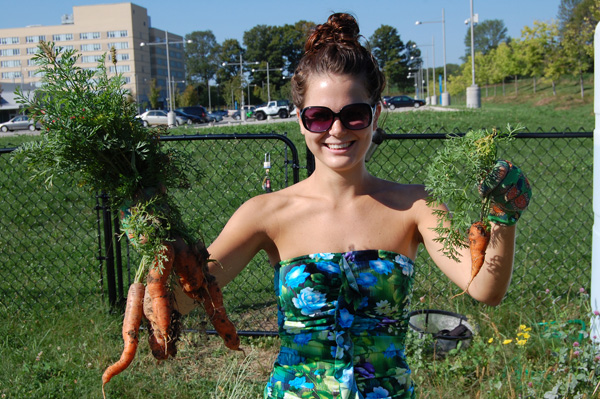Lakehead’s research garden shows dramatic results
September 23, 2013 – Orillia, ON
Over the past few months, students at Orillia’s Lakehead University, as part of an innovative project with a local plastics company, have learned the value of field studies – in a field adjacent to the University Avenue campus.
Under the leadership of Lakehead professor Chris Murray and Derek Rynard of EcoPoly Solutions, a 100-foot by 100-foot trial farm was cultivated at the campus to test a ground-breaking plastic mulch developed by the local company. Coupled with lab results, the farm findings will be used by the company to back up its own testing.
The results from the trial farm – where vegetables were grown using traditional methods alongside vegetables grown under the agricultural mulch – were dramatic.
“The difference between the two was night and day,” said Murray. “It was pretty incredible to see the results in a tangible way.”
Murray, an amateur gardener, was surprised by the effectiveness of the plastic mulch.
“I’ve tried to grow carrots at home and I have never achieved anything close to what we were able to grow here,” said Murray, who noted the bountiful crop blossomed despite very little weeding and very little water. “I can only imagine how well this would work for farmers who put in the necessary work.”
While the carrots, onions and broccoli flourished under the mulch – which simulates a greenhouse while suppressing weeds and conserving water – the vegetables that did not have the advantage of the mulch were smaller and less plentiful.
“Basically, it confirmed our lab studies, but it did so in such a way that was a real eye opener for our students,” said Murray. “We were able to observe exactly when the mulch started to break down – and under what conditions. And, for the company, it was really a confirmation of their own studies.”
Rynard said Lakehead’s independent field and lab studies are critical for the company as it continues to plant roots in a multi-billion-dollar industry.
“If Lakehead University wasn’t here to conduct this testing, it’s really our word against our competitors’ word,” Rynard explained. “This provides us with third-party credibility that is really important to us as we enter global markets with these products.”
He said the field tests are of particular importance. “We have reams of data, but to have real-world data that shows exactly how and when the product breaks down, how the crops performed … that’s what our agricultural clients really want,” he said.
To date, the partnership has proven beneficial for Rynard’s company and for Lakehead University. For that reason, they have decided to extend the project, which has been supported by the Ontario Centres of Excellence.
“There’s really no reason not to continue,” said Murray. “Now, we can see how they perform in the winter … we can capture fall, winter and early spring data.”
Farmers, especially those in Europe, have used plastic mulch more and more in recent years, said Rynard.
“But these have always been single-use products. A farmer has to rip it up, bury it on the farm, burn it or send it to the landfill,” he said.
With EcoPoly Solutions’ revolutionary new product, a farmer, after harvest, can simply plow the mulch into the earth to decompose into biomass. The green-focused company is working on a variety of designs for a variety of applications: a six-week film, a three-month film and a six-month film for various growing conditions.
“What we want to be able to tell prospective clients is that when you grow carrots, for example, here’s the best film to use,” Rynard said. “That’s why this research is so important.”
The project is also important to Lakehead’s students – and its reputation – Murray said.
“Kayla Snyder, who has worked on this project and, like some of our other students, had the opportunity to work in (Rynard’s) impressive state-of-the-art lab in Newmarket, has become our first master’s student in chemistry and will continue to work on this project,” said Murray. “For our students to have access to this lab and to their world-class staff is incredible.”
Murray hopes it’s just the beginning.
“We’re becoming a leader in research,” said Murray, a Park Street Collegiate Institute graduate whose field of study is biodegradable plastics. “We have taken baby steps with this project … and we are excited about what the future might hold.”
- 30 -

Kayla Snyder, of Everett, was part of the team of students at Lakehead University who conducted wind, water and soil tests in the trial garden at the Orillia campus. Snyder is showing the dramatic results of the field study: in her right hand are carrots grown under plastic mulch, while in her left hand, are the smaller, less plentiful carrots grown without the mulch.

